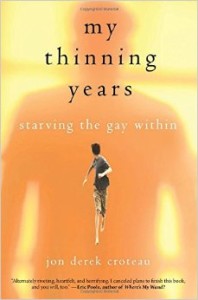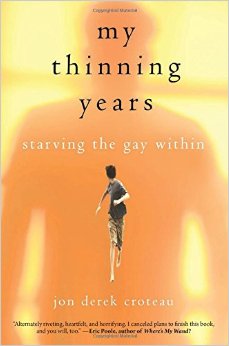 My Thinning Years: Starving the Gay Within
My Thinning Years: Starving the Gay Within
by Jon Derek Croteau
Hazelden. 240 pages, $14.95
IN MY GENERATION, gay boys and their fathers had complicated relationships. I know I did, growing up in a working-class Irish Catholic family in Chicago some sixty years ago. The middle child of five and oldest boy, I was not what my dad imagined his first son to be. There weren’t any role models back then for parents or questioning children, no networks of support. Popular culture demonized “homosexuals” as pathetic and lonely outcasts. My teenage years were the worst, when burgeoning sexuality was at its best conflicted and isolating. There was no one else who shared my secret, or at least that’s what I thought, until college.
There are many poignant parallels for me in Jon Derek Croteau’s beautifully crafted memoir of surviving an abusive father and overcoming his own anorexia and internalized homophobia. The author dreamed of being in school musicals, but instead his father made him play sports year-round. Even after a plate in his hip was shattered playing football, his father forced him into basketball and baseball, belittling him in public and screaming at him in the car rides home about how embarrassing the boy’s ineptitude was.
Eager to please his tyrannical father, Croteau persevered, breaking an eye socket and shattering a wrist bone. His sympathetic but ineffectual mother tried but failed to intervene. At home, he avoided contact with his father; the slightest provocation could land him in his room without dinner, often accompanied by welt marks from his father’s belt. The bedroom became Croteau’s sanctuary where shelves, drawers, and closets were fastidiously organized—no chaos here, as he sang along quietly to Whitney Houston.
In high school, still desperate for his father’s approval, Croteau excelled by overcompensating, becoming captain of the tennis team, editor of the yearbook, president of student council, and an honors student. He was everybody’s best friend but utterly alone as he suppressed his sexuality. Girls sought boy advice from him, and boys sought dating tips. Unrequited bromance crushes were awkward and painful.
The author felt ill-equipped to attend college, so he spent a gap year at home working at a bank, even trying a three-week Outward Bound experience to bolster his confidence. During this period, anorexia, bulimia, and obsessive running overwhelmed his body as he tried to “starve the faggot inside.” Once away at college, the self-loathing and self-destructiveness escalated: “binging, purging, starving, and punitive jogging” were all part of the cycle. Sexual encounters were few and always complicated, the specter of his father looming under every bed. Graduating summa cum laude from college in only three years, Croteau then attended graduate school to study counseling psychology. This pleased, but did not appease, his father. As life progressed, boyfriends were occasionally welcomed home, but visits always ended in paternal tirades and emotional devastation.
In therapy and in his academic studies, Croteau painstakingly began to deal with his repressed anger against his father and to see his own lack of self-acceptance as the root of his eating disorder. Meeting the man who is now his husband was also part of his healing journey. “By letting in all of that love, I learned how to truly love and accept myself,” he writes. Family reconciliations were attempted after his mother’s death, and then again after his father’s quadruple bypass surgery. All came to naught, as his father’s venomous condemnation always erupted. In the end, though, the author finds his peace by severing ties with his father, while absolving him thus: “And even though you will never be a part of my life. … I need you to know that I forgive you. I have forgiven you.”
Croteau’s courageous disclosure of his arduous journey toward self-acceptance is especially relevant for many gay men who have been disenfranchised from their families of origin. The book also illuminates the realities of male eating disorders, adding considerably to the literature on anorexia, still wrongly perceived as solely a female disease. Today, Croteau and his husband live in Vermont. He counsels executives on empathic leadership and inclusivity, blogs for the Huffington Post, and is a speaker with the National Eating Disorders Association.
________________________________________________________
John R. Killacky is executive director of the Flynn Center for the Performing Arts, a renovated art deco movie palace in Burlington, VT.





